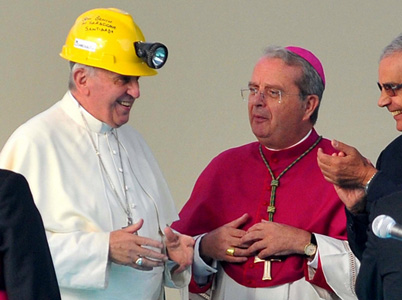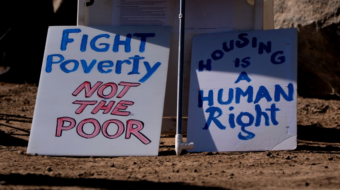
ROME (PAI) – Building on statements he has made before – and this time, making it clear it’s his official position – Francis I is blasting the “tyranny” of unfettered capitalism, plus economic inequity and financial finagling. He demands that politicians guarantee their citizens “dignified work, education and health care.”
And in a 224-page Apostolic Exhortation (Evangelii Gaudium, translated into English as The Joy of the Gospel) to Catholic bishops, priests, workers and the laity, issued Nov. 25, Francis compares “the idolatry of money” to idolatry of the golden calf recounted in the Book of Exodus, Chapter 32. He calls it a “new tyranny,” and declares “Money must serve, not rule.”
“Just as the commandment ‘Thou shalt not kill,’ sets a limit in order to safeguard the value of human life, today we also have to say ‘Thou shalt not,’ to an economy of exclusion and inequality. Such an economy kills,” the Pope says.
The exhortation makes it clear that Francis expects Catholic officials and laity to follow its principles. The document is not the first time Francis I denounced economic inequality and spoken up for workers, the jobless and the poor, but it is the strongest and most comprehensive statement on the issue during his papacy.
Several months ago in Sardinia, Francis threw away his prepared sermon – which was already critical of economic trends – and slammed the chasm between the rich and the rest of us. This exhortation goes far beyond that sermon.
Catholic Social Thought
Francis’ statement is also squarely in one church tradition, of Catholic Social Thought, the tradition that backs workers and unions and denounces the impact of unfettered industrialization and capitalism.
The publication of Pope Leo XIII’s encyclical Rerum Novarum in 1891 is considered the beginning of the development of a recognizable body of social teaching in the Catholic Church. Then on May 15, 1961, Pope John XXIII released Mater et Magistra, subtitled “Christianity and Social Progress.” This encyclical expanded the Church’s social doctrine to cover the obligation of rich countries to assist poor countries. On April 11, 1963, Pope John XXIII expanded further on this in Pacem in Terris, Peace on Earth, the first encyclical addressed to both Catholics and non-Catholics.
But over the years, many Catholics, including lay leaders, politicians, industrialists and even clergy, have ignored or defied Catholic Social Thought’s precepts. In this document, Francis wants them – and the world’s 1 billion Catholics-to follow those precepts.
No to an economy of exclusion
Francis exhortation, which covers issues besides economics, (peace, social justice, the family, faith and politics, ecumenism, interreligious dialogue, and the role of women and of the laity in the Church) is more detailed and grounds his words in both the Old Testament, including the Torah and the Hebrew prophets, and in the New Testament and the Gospels. And Francis pulls no punches.
He also made it clear he seeks results. “We cannot passively and calmly wait in our church buildings,” he says, citing Latin American bishops. “We need to move from a pastoral ministry of mere conservation to a decidedly missionary pastoral ministry.
“For example, if in the course of the liturgical year a parish priest speaks about temperance 10 times but only mentions charity or justice two or three times, an imbalance results, and precisely those virtues which ought to be most present in preaching and catechesis are overlooked,” Francis warns later.
Labeling his section on wealth and inequality “No to an economy of exclusion,” Francis started with his ‘Thou shalt not,’ comment and went on from there.
“How can it be that it is not a news item when an elderly homeless person dies of exposure, but it is news when the stock market loses two points?” Francis asks. “This is a case of exclusion.
“Can we continue to stand by when food is thrown away while people are starving? This is a case of inequality. Today everything comes under the laws of competition and the survival of the fittest, where the powerful feed upon the powerless. As a consequence, masses of people find themselves excluded and marginalized, without work, without possibilities, without any means of escape.”
The Pope also criticizes corporate attitudes that “human beings are themselves considered consumer goods to be used and then discarded. We have created a ‘throw away’ culture that is now spreading.
“It is no longer simply about exploitation and oppression, but something new,” Francis continues. “Exclusion ultimately has to do with what it means to be a part of the society in which we live; those excluded are no longer society’s underside or its fringes or its disenfranchised – they are no longer even a part of it. The excluded are not the ‘exploited’ but the outcast, the ‘leftovers,'” he states.
Crude and naive trust in the goodness of those wielding economic power
Politics, businesses and economics that serve only the rich are the Pope’s next target, in the next paragraph: “In this context, some people continue to defend trickle-down theories which assume that economic growth, encouraged by a free market, will inevitably succeed in bringing about greater justice and inclusiveness in the world.
“This opinion, which has never been confirmed by the facts, expresses a crude and naive trust in the goodness of those wielding economic power and in the sacralized workings of the prevailing economic system. Meanwhile, the excluded are still waiting.
“To sustain a lifestyle which excludes others, or to sustain enthusiasm for that selfish ideal, a globalization of indifference has developed,” he adds. People reject a need to help others, “as though all this were someone else’s responsibility and not our own.” Francis blames that on a deadening “culture of prosperity” which “thrills” consumers with new possessions. “In the meantime, all those lives stunted for lack of opportunity seem a mere spectacle; they fail to move us.”
“Idolatry of money” and “dictatorship of an impersonal economy,” Francis says, comes from accepting “its domination” of people and societies. “The current financial crisis can make us overlook the fact that it originated in a profound human crisis: The denial of the primacy of the human person!” (His emphasis) Francis then compares that current financial idolatry to worship of the Golden Calf.
“The worldwide crisis affecting finance and the economy lays bare their imbalances and above all their lack of real concern for human beings. Man is reduced to one of his needs alone: Consumption. While the earnings of a minority are growing exponentially, so too is the gap separating the majority from the prosperity enjoyed by those happy few.
Not to share one’s wealth with the poor is to steal from them
“This imbalance is the result of ideologies which defend the absolute autonomy of the marketplace and financial speculation. Consequently, they reject the right of states, charged with vigilance for the common good, to exercise any form of control. A new tyranny is thus born.” All this, plus “widespread corruption, self-serving tax evasion” and a “system which tends to devour everything which stands in the way of increased profits and…a deified market” is “a rejection of God,” Francis says.
“With this in mind, I encourage financial experts and political leaders to ponder the words of one of the sages of antiquity: ‘Not to share one’s wealth with the poor is to steal from them and to take away their livelihood. It is not our own goods which we hold, but theirs.’ A financial reform open to such ethical considerations would require a vigorous change of approach” by political leaders, he adds. The politicians should “face this challenge with determination and an eye to the future.”
The full text of the new Apostolic Exhortation can be found on the Vatican website.
Photo: On his visit to Sardinia, Pope Francis wears a helmet given him by a local coal miner. AP










